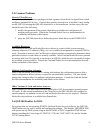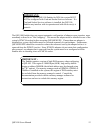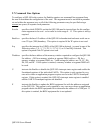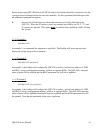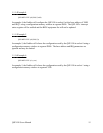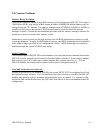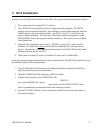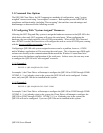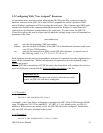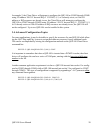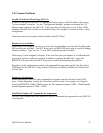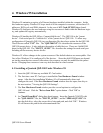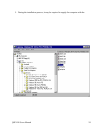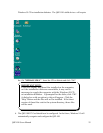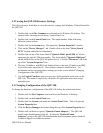
3.3 Configuring With "User Assigned" Resources
As mentioned in the previous section, allowing the OS/2 Plug-and-Play system to assign the
hardware resources to the QSP-100 is ideal for OS/2 programs but can be a problem if DOS
and/or Windows applications will be accessing the serial ports. This is because most DOS appli-
cations write directly to the communications hardware and the Windows' Control Panel also
wants to know the hardware configuration of the serial ports. For this reason, the QSP-100
Client Driver allows the user to request specific hardware settings using a series of command line
arguments of the form
(port,address,irq)
port specifies the beginning COM port number
address specifies the base I/O address of the QSP-100 in hexadecimal and must reside on an
even 32-byte (20H) boundary.
irq specifies the interrupt level (IRQ) of the QSP-100 in decimal. irq must be one of
the following values: 3, 4, 5, 7, 9, 10, 11, 12, 14, or 15.
Each argument must be enclosed in parentheses and must be separated from other arguments by a
space on the command line. Within each argument, the parameters must be separated using a
comma (no spaces).
When a QSP-100 is inserted into a PCMCIA socket, the client driver will configure the card as a
series of COM ports, starting with the lowest available port number in the list.
IMPORTANT:
If the user specified resources are in-use by other devices in the
system, the QSP-100 will not be configured.
1
.1.1.1Example 1
DEVICE=C:\QSP-100\QSP100.SYS (3,100,5)
In example 1, the Client Driver will attempt to configure the QSP-100 as COM3 through COM6
using I/O addresses 100-11F hex and IRQ 5. If COM3, 4, 5, or 6 already exists, or if the I/O
address or IRQ resources are already in use, the QSP-100 will not be configured. Furthermore,
only one QSP-100 can be installed in this system.
1.1.1.2Example 2
DEVICE=C:\QSP-100\QSP100.SYS (7,120,15) (3,300,4)
QSP-100 Users Manual 19



